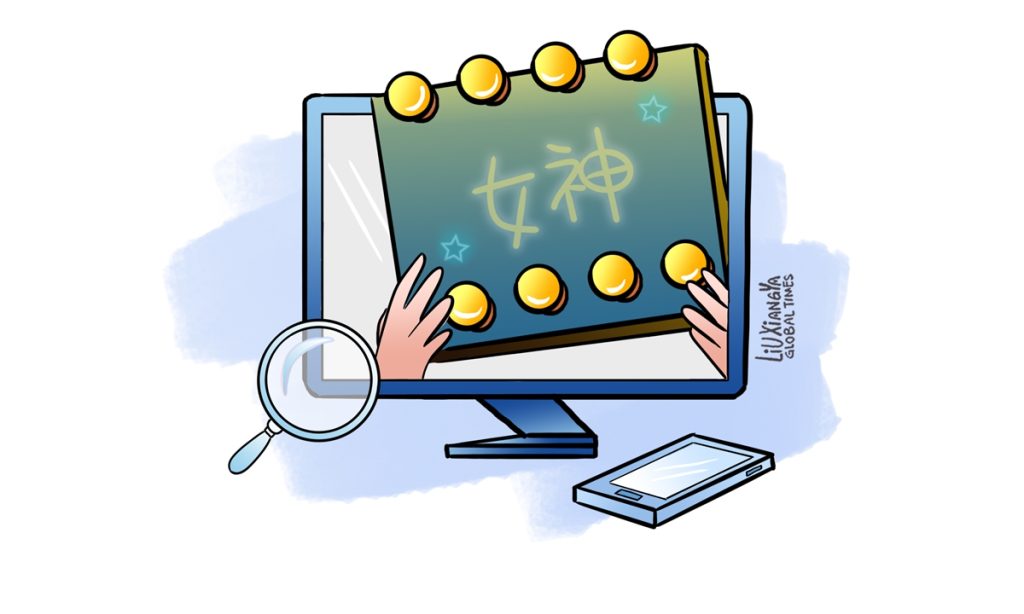Bane and boon of fandom culture

With the rise of social media networks and involvement of capital, fandom culture as a niche subculture has attracted more and more attention from the mainstream.
From an external perspective, the rapid advancement of technology and social media platforms have served as prerequisites, while investment from the capital market has fueled its development. As to the internal factors, the formation of fan communities meets people's psychological needs. For one thing, in today's fast-paced modern society, some young people have made online platforms their first choice to ease loneliness and express their feelings, while fan clubs allow people to show off their personality, achieve self-satisfaction and gain a sense of community and belonging.
Debate about fandom culture tends to focus on its potential dangers.
To begin with, the distortion of values caused by group polarization, especially for younger generations, leads to shocking incidents like pouring out drink bottles just to obtain a QR code inside the bottle cap to support an idol. Besides wasting resources and over-consumption, craze-driven irrational behavior such as stalking, doxing, fighting, and invading people's privacy have endangered public safety.
More seriously, the uneven occupation of online resources by celebrity topics or entertainment events triggered by a large amount of fan participation and capital manipulation takes atte ntion away from significant issues that involve public life. Under such circumstances, our culture, sports, education, and businesses would likely be reduced to entertainment accessories, and the final result might lead to actually "amusing" ourselves to death.
However, as some observers fret about these dystopian scenarios, others focus on the potential rewards.
First, personalized consumption in fandom culture boosts the economy. In August, a popular Chinese idol group fueled a ticket-buying binge in which the first batch of over 33,000 tickets were snapped up in a few seconds. Revenue on ticket and live-streaming platforms reached more than 100 million yuan ($13.6 million) and drove local tourism revenue up to 416 million yuan. With social media, forces converge quickly, and fans can do great things for their idols. Their desire for expression, interactivity, and participation leads to a long tail effect in the vast fan market, which contains enormous consumption potential and benefits upstream and downstream industry development.
Secondly, fandom culture alleviates the crisis of contemporary social identity and soothes our souls. As a social subculture system, fandom culture is based on seeking social interaction and identity recognition. Fans build emotional trust, form a community with common ideals, and find a new identity and a sense of belonging through communication and interaction with group members in an increasingly atomized society. For fans who have gone through their youth accompanied by some idols, nostalgia reveals their inner desire for a familiar, safe, and stable environment that serves as a spiritual sanctuary and utopia for rosy memories, helping them confront the fragmentation of the modern world and the discomfort of the rapid changes under globalization.
Fandom culture also empowers society. An idol who constantly contributes positive energy is an essential source of cohesion in society. Fans' heartfelt wishes to become better people alongside their idols have led them to ask idols to behave with higher standards and set good examples.
For instance, some celebrities encourage fans to develop good reading habits, promote Chinese traditional culture, which is increasingly favored by young people, and participate in activities such as environmental protection and poverty alleviation. Several public benefit activities have benefited from the tremendous force and passion of fan communities, which are mainly composed of the Post-1990 and Post-2000 generations, who possess a higher level of education and more self-discipline.
A fan may be a company staff, a professional photographer, or an illustrator and designer. They all have proficiency in a particular line. Thus, their efforts not only bring more energy and sunshine to society but also enrich the cultural ecology.
So, fan culture is a double-edged sword. On the one hand, based on similar interests or shared memory, it allows fans to build social networks to find a new identity, accumulate real or virtual resources both online and offline, and form informal organizations. On the other hand, it also causes the group to get stuck in information cocoons and possibly tend to behave irrationally due to the existence of the "echo chamber effect." Fans are easily reduced to digital laborers and "one-dimensional people."
Fan culture, driven by technology and capital, alters what we think and how we behave without us realizing it, making a difference in the overall cyberculture and even society as a whole. Whether it is a bane or boon depends on how we lead and guide.
Accordingly, we should, above all, realize the pros and cons brought about by the development of fan culture and strengthen top-level design to shape a comprehensive paradigm featuring multi-party collaboration, namely government, platform, and fan groups, which will promote economic development, generate positive energy and minimize adverse effects.